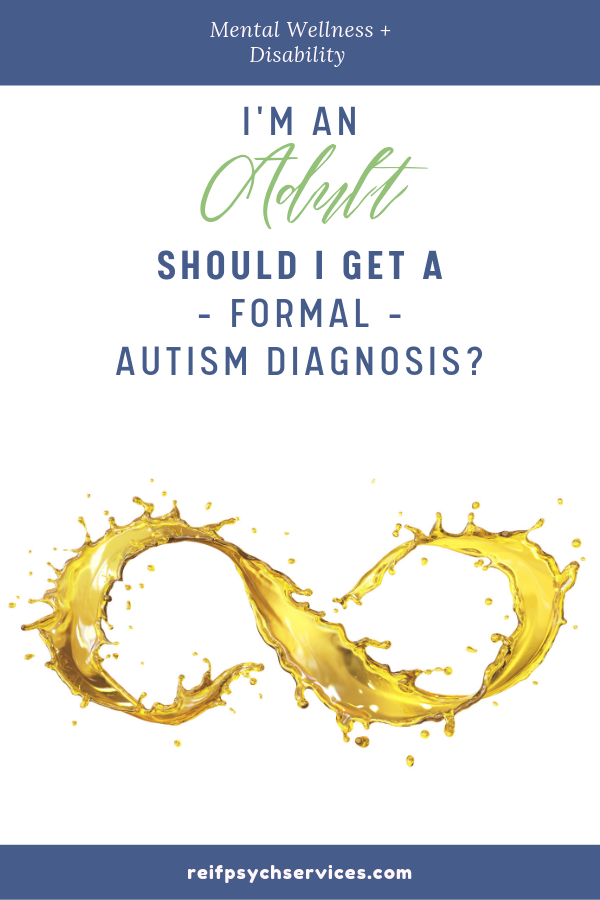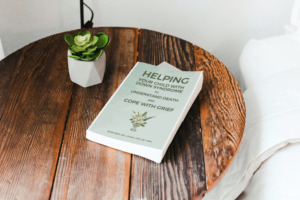Maybe you’ve known from a very young age that you were different.
Or perhaps you started to piece together a possible explanation after you failed at something. After college, a job, or a marriage didn’t work out, you started to wonder why things were so hard for you.
Perhaps you realized after your child received an Autism diagnosis. Hearing your child’s diagnosis explained, you noticed many parallels to your own childhood, your own way of seeing the world.
You may have completed an online quiz that confirmed your suspicions. Perhaps you even talked with a psychologist or physician who said you ‘seem to meet criteria’ for Autism.
However you got here, where you are is this. You’re an adult who’s pretty sure you’re Autistic, but who has never gotten a formal diagnosis.
In my counseling practice I offer therapy for adults with intellectual and developmental disabilities. I see many clients who believe they are on the Autism spectrum, but who have never gone through assessment to confirm this.
Many of them ask the same question:
Should I get a formal Autism diagnosis if I’m an adult?

Five ways that getting a formal Autism diagnosis as an adult can be helpful
Whether or not you pursue a formal Autism diagnosis as an adult is an entirely personal decision. There is truly no right or wrong approach.
However, there are some possible benefits to getting a diagnosis that you should consider.
1. More/better services, supports, and accommodations
Having a formal diagnosis can make it easier to get supports. This includes educational accommodations and Vocational Rehabilitation supports. If you find that your Autistic traits make school or work difficult for you, this can be a powerful reason to pursue a formal diagnosis. Having a diagnosis will make it easier for you to receive the supports that will help you at school and at work.
It can also help you find the right supports in other areas, including mental health services. Knowing that you’re Autistic can help if you’re trying to find a counselor who won’t shame you for being Autistic. Or, suppose you’re struggling in your relationship. You’ll know that Autism is likely impacting your relationships. You’ll be able to look for a counselor who understands neurodiverse couples.
2. Peace with your past
I recently worked with a counseling client who wasn’t formally diagnosed until they were in their late 60’s. This client explained that having a name to explain the struggles they’d faced gave them more self-compassion. They also recognized their inherent strengths. The person realized that they grew up different, and without support or understanding. They saw that they still managed to be successful in relationships and work. This realization gave them a great sense of pride and accomplishment.
Many of my clients who received an Autism diagnosis later in life have echoed this sentiment. Having a diagnosis can give you peace of mind about why growing up was difficult for you. It’s not because you were somehow wrong or broken. You were just different in a world that wasn’t ready to accept or accommodate you.
3. A sense of belonging
Knowing that we belong to a group can do wonders to help our self-esteem and feelings of confidence. We are no longer loners. We share an identity with others.
Communities for Autistic adults are generally helpful, welcoming, and supportive groups. This is true whether these are in-person or online communities.
If you’re tired of feeling different and weird, it can be nice to know that there are other people out there who felt the same. You may find relief in joining a community founded on shared experience and mutual respect for individual differences.
4. Increased insight as a parent of an Autistic child
I work with many clients who realize that they are on the spectrum after their Autistic child is diagnosed.
For these parents, knowing that they share their diagnosis with their child helps them relate as parents. They can share their childhood struggles, and have the benefit of intuitively knowing what can help if their child is struggling.
5. Deeper personal understanding
Understanding what Autism is is helpful. But knowing how your Autism impacts your choices, behaviors, and thoughts, is invaluable.
With Autism as a framework, it can be much easier to know why certain tasks are difficult for you. It can also help you better understand your own strengths.
Six unexpected things to be ready for if you receive a formal Autism diagnosis as an adult
The potential benefits I’ve listed above are reasons enough for many adults to seek out a formal Autism diagnosis.
However, I have seen many adults face some unexpected outcomes after receiving an Autism diagnosis later in life.
Here are the surprising realities you may want to consider before deciding to undergo assessment for Autism as an adult
1. Trouble finding an evaluator, or a very long waitlist
Many people build up the courage to reach out to request an assessment, only to be told that there’s no psychologist in their area who can offer this.
Or, you may find someone who offers this service, only to learn that there’s a waitlist of 6-12 months.
It can feel deflating to mentally equip yourself to undergo testing and receive a diagnosis, only to learn that you’ll have to wait many months before you can cross it off your to-do list.
If you’re in or near where I practice, in Cary, North Carolina, you can contact the TEACCH Regional center nearest you to get on their waitlist for assessment.
2. Digging into the past
Autism is a developmental disability, meaning that to meet criteria for a diagnosis, you will be asked to discuss your development as a child.
The psychologist or physician who is doing the assessment may ask to see medical or school records, or to speak with elderly family members, to learn more about what you were like as a child.
This can sometimes be difficult for adults seeking diagnosis. You may feel that it would be more helpful to focus on your current struggles that have led you want a formal Autism diagnosis as an adult. It may feel counterproductive to focus on your experiences as a child. But, this is essential for an assessor to do to differentiate between Autism and other possible explanations for your experiences.
3. Getting a diagnosis you didn’t expect
You may have mentally prepared yourself to hear the diagnostician say “Yes, I believe that you are on the Autism spectrum.” You may even refer to yourself as Autistic with friends and family, and feel quite comfortable with the idea that you’re Autistic.
If that describes you, it can be shocking to be told that you don’t meet criteria for Autism, but that you are actually experiencing social anxiety, obsessive compulsive personality disorder, or another condition.
4. Anger or grief about past mis-diagnosis
Getting an accurate Autism diagnosis can be empowering and validating for adults. For some people though, having the correct name for what you experience can make you think twice about all the other labels you’ve had.
Experts may have told you that you had learning disabilities, emotional and behavioral challenges, and many other inaccurate diagnosis.
It makes sense why you might feel anger or grief that you spent so long receiving treatment for conditions you didn’t have. Labeled as something you weren’t.
Rather than try to ‘fast forward’ to acceptance of your past, know that it’s OK to spend some time thinking about how this mis-diagnosis changed your life. To consider the losses you’ve faced because of it.
If your grief or anger about your experiences is overwhelming, please seek out support from a licensed mental health provider.
5. Close friends, family, and coworkers may disbelieve you.
Cognitive inflexibility is a hallmark symptom of Autism. But try telling your parents, your partner, or your friends that you’ve gotten a formal Autism diagnosis as an adult. You may encounter some inflexibility from the neurotypical people in your life!
A client once told me that her parents’ response to her sharing her diagnosis was:
“But you make eye contact! You’re married! You have a job! You’re nothing like Rain Man. You’re not Autistic, you’re just being dramatic.”
It probably took you some serious deliberation before you worked up the courage to seek out evaluation. It can feel horribly invalidating to have those who know you best tell you that the diagnosis you have devoted much time, cost, and consideration to achieving is wrong.
6. Now that you have the information, you must decide when, how, and with whom you’ll share it.
As a recently diagnosed Autistic adult, you now must decide when, how, and with whom you will share this information about yourself. Or if you’ll share it at all.
- Will you tell potential romantic partners about your Autism before the first date? Or will you wait until the second or third to reveal your diagnosis?
- Will you tell your boss, so that they can understand how Autism impacts your work performance? Or will you continue to mask at work?
- How about the cashier at the grocery store who always chastises you for not moving fast enough and for taking up too much of her time with your questions? Would knowing that you’re Autistic help your interactions improve?
Disclosure is a constant evaluation of possible risks versus potential benefits. It can be overwhelming to newly diagnosed adults to determine if, how, and with whom they will share their diagnosis.
Some people find it helpful to approach disclosure as a hierarchy. Identify one group of people that you’ll disclose to first, perhaps friends or close family members. Then, only move on to disclosing to new groups once you’re comfortable with your disclosure to the previous group.
Summary
If you are considering getting a formal Autism diagnosis as an adult, I hope that this post has been helpful to you. I believe that there is no correct time or reason to seek evaluation as an adult. There is only the right time and the right reasons for you.
If this post resonated with you, please use the social share buttons to spread the word!
Keep reading
Other posts you may be interested in
How to Know if Someone is a Real Friend. A Quiz for Teens and Adults with IDD.
In my counseling practice, I offer mental health counseling for teens and adults with IDD. Many of my clients who have Down syndrome, Cerebral palsy, and other disabilities have lots of meaningful friendships in their lives. But sometimes, they ask “how can I know if someone is a real friend?” Maybe you have a friend […]












